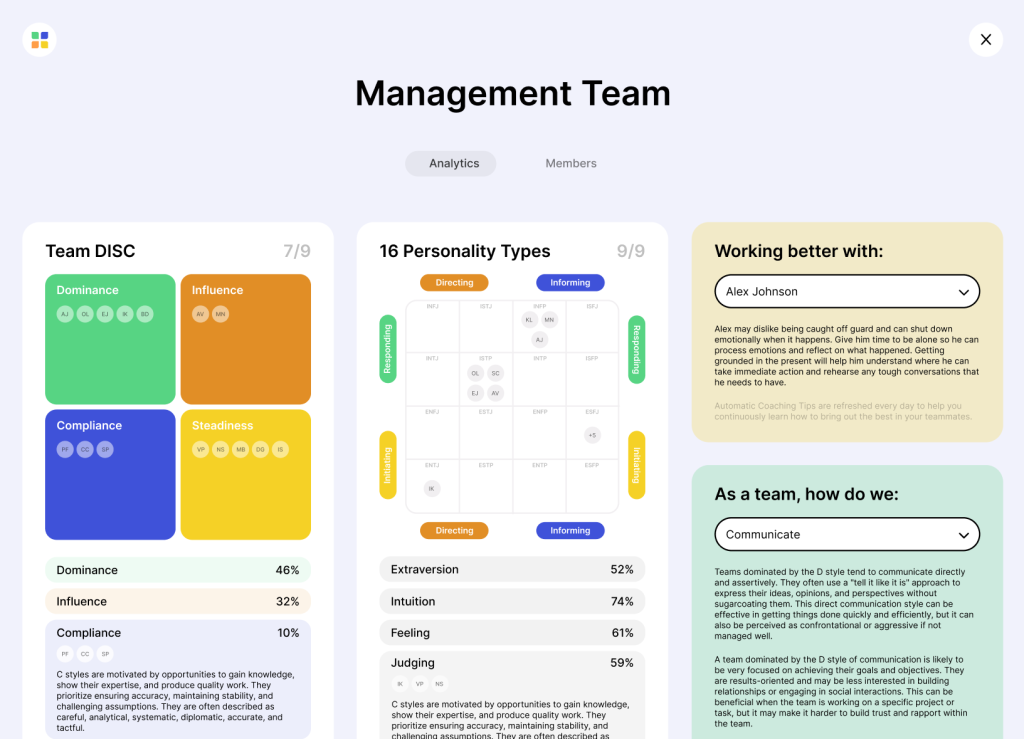The research has shown that there are Assertive ISFPs (ISFP-A) and Turbulent ISPFs (ISPF-T) that show differences in how they represent themselves.
These varieties are seen in how they handle stress, interact with other people, express emotions, and their level of self-confidence.
The ISFP personality is the one that goes by the name of Adventurer, Creator, or Composer.
The acronym ISPF stands for the four cognitive functions (introverted, sensing, feeling, and perceiving) that best describe these people.
The Introverted function means that these individuals get energized by spending time alone and contemplating on, for them, essential issues. Thanks to the Sensing function, the ISFP personality is known to be overly detail-conscious and aware of even the slightest changes.
ISFPs make decisions based on their own values and feelings, while the Perceiving function makes them flexible, spontaneous, and easy-going.
And, while people with an adventurer personalities are friendly loners with an exceptionally delicate sense of aesthetics and beauty, their identities reveal two ends within the same personality type.
Differences Between ISFP-A and ISFP-T
Friendships
When it comes to friendships, people with creator personalities are the ones that are loved by friends thanks to their laid-back attitude.
They are spontaneous and love getting engaged in everyday activities that don’t require lots of planning. ISFPs are not particularly interested in long in-depth conversations, nor do they get involved in discussions.
Their idea of friendship means enjoying a fun activity together with their friends and minding their own business.
The difference between the Assertive ISFP and the Turbulent ones is mostly noticed in how they react to their friends’ remarks.
Due to their frivolous lifestyle and the quest for adventure, many ISFPs’ friends are likely to express their concerns and advice on how they need to take things more seriously.
And this is where Assertive ISFPs are more likely to ignore such comments, while Turbulent ISFPs could easily take things way more personally.
This is due to Turbulent ISFPs’ lower level of confidence and their inclination to question their worth.
Relationships
Introverts as they are, ISFPs in relationships are caring, fun, and involved, but very careful about opening up.
Adventurer personality types prefer focusing on their partner’s feelings and needs rather than their own. They can be quite mysterious and skillfully avoid expressing their own emotions.
They seldom consciously attempt to reverse the relationship’s mood with a focus on their personal desires or feelings.
As they are inclined to dwell on the present moment, they have vivid imagination and initiative to do things on the go.
They are charismatic and loving, and as their relationship progresses, they can turn into excellent partners who gradually reveal their true selves.
What ISFP personalities appreciate is the notion of shared love and emotional support. Individuals with adventurer personalities would typically never ask for it but could suffer a lot if they don’t get the same feedback from their partners.
But within the segment of emotional control lies the difference between the Assertive and Turbulent ISFPs.
Assertive adventurers feel they can exhibit much more control over their emotions and deal with them. They are less likely to feel hurt in case their feelings are not shared or when they break up the relationship.
Contrary to ISFP-A, Turbulent Creators show more understanding of people’s feelings and report less being in control over their emotions.
Workplace
ISFPs are individuals who put on the throne the need for artistic or creative freedom. Nothing is more critical for them than the chance to vividly depict their innate creativity in the most exuberant way.
This often includes experimenting with things, and more often than not, they are the ones who set new trends.
Broadly speaking, ISFPs’ job paths include everything that makes use of their natural talents, such as photography, art, design, and music.
And, while both ISFPs are drawn to take maximum advantage of their potential, Turbulent Adventurers are more likely to be influenced by society’s norms and expectations than their fellow counterparts.
Since their general self-confidence level tends to be lower, they would try to fit the system and even try to take up jobs that require organization and planning.
This, however, might have negative consequences and steal away their freedom.
Working in a Team
ISFPs are lone wolves, dedicated to working in accordance with their own impulses. They are people of action and love taking charge, but their spontaneity and lack of sticking to the predetermined norms get things complicated.
They desire to experiment, do things their way, and try unstandardized ways. All this defies the standards of strictly controlled and managed working environments.
ISPFs can be very successful when tackling issues on an individual basis. When we compare the Turbulent ISFP to Assertive ones, it is noticeable that Turbulent ones are more likely to comply with norms and perform in line with the predetermined requirements.
Assertive Adventurers are more likely to stand out with remarks, ideas, or suggestions. In contrast, Turbulent ones would rather mind their own business and avoid confrontations than stand out in any way.
ISFP-A Strengths and Weaknesses
Attracted to the outer world
Assertive Creators find beauty in the world outside their limits. They love to explore the unknown and find beauty in the broader natural surroundings.
They rarely stick to their home grounds when they need energy recharge, and what they’d instead do is spend time alone in a place they’ve never been before.
Appear extroverted
Even though ISFPs are introverted, Assertive Adventurers express spontaneous curiosity and vivid expression when interacting with other people. This usually gives the wrong impression of being outgoing.
Self-Confident
Assertive Creator personality individuals are aware of their unique qualities and the unusual approach they have to the world surrounding them. They are bold to experiment and resent the idea of being placed inside the box.
Able to control the stress
All ISFPs are doers who live in the present, but that can be stressful too, particularly when things turn in an unexpected direction. Assertive ISFPs, though, can minimize the significance of the stressors and disregard their negative impact.
They could even turn problems into a form of art and transform the negative into an artistic expression. That helps them thrive in stressful environments and still be creative.
Competent
The high amount of self-awareness allows Assertive Creators to be much more effective in doing their jobs as they feel assured that they are able to do the job effortlessly. They embrace responsibilities with ease and try to be as effective as possible.
ISFP-A Weaknesses They Should Work On
Too lofty approach to severe issues
While they are very good at coping with stressors, they could well enough disregard the importance of the problems. Not addressing problems adequately might lead them to conflicts and even more complicated relationships.
Might Appear Arrogant
The high level of self-confidence might make them look arrogant and self-obsessed, especially when working in a team. ISFPs appear self-confident, and they generally know what they are doing, so any suggestions and advice are scoffed at.
ISFP-T Strengths and Weaknesses
Cautious
Equally attracted to beauty and aesthetics as their Assertive counterparts, the Turbulent ISFP find inspiration on familiar grounds, within their ‘comfort zone.’
Aware of Potential Problems
Unlike the Assertive ISFPs, the Turbulent Adventurers are usually more focused on the problems and better understand their significance. Therefore, they are more prone to looking for a solution and working toward finding proper closure.
Keep up with Social Standards
Turbulent ISFPs are more concerned about the impression they leave on society, so they tend to stick to moral and social standards much more than Assertive ISFPs.
ISFP-T Weaknesses They Should Work On
They Have a Low Self-Confidence
They are unsure about their originality, creativity, and talent to present something new and unique.
They are asking for constant confirmation or support from the people they care about and are afraid of testing completely new things or ideas.
They Are Sensitive to Stress
Turbulent Adventurers are definitely not stress-resistant as they can get easily stressed out in various situations. On the other hand, it can lower their spirit of creativity and uniqueness, to the point of being with guard up almost all the time if in a stressed environment.
Jobs and Career Paths for ISFP-A
The common trait for all ISFPs is their inclination to act and live in the moment. They are practical doers who go with the flow by taking a chance of everything that life has given them.
In their working environment, it means that Adventurer personality types think and act outside the box, often shining with creative ideas and practical solutions.
ISFPs have an enhanced sense of aesthetics and beauty, and they often see the same thing from multiple perspectives to find differences from each angle.
They boast highly developed sensory awareness and excel in all professions that include creative skillfulness and design.
However, bearing in mind the differences in their identities, some ISPF job paths match better Assertive Adventurers than their Turbulent counterparts.
These are the ten most recommended jobs for ISFP-A:
- Fashion Designer
- Artist
- Graphic Designer
- Gardener
- Fitness Trainer
- Dietitian
- Recreation Worker
- Pharmacist
- Forester
- Chef
Jobs and Career Paths That ISFP-A Should Definitely Avoid
Jobs that require focusing on details and facts, intensive planning, and meeting deadlines can put a lot of pressure on Assertive ISFPs.
They can feel restrained and unmotivated and therefore become less successful than working in jobs that offer greater creativity.
ISFP-As are advised to avoid the following positions:
- Sales or Marketing Manager
- Surgeon
- Dentist
- Engineer
- Psychiatrist
- Judge
- Auditor
- Executive
- Attorney
Jobs and Career Paths for ISFP-T
Turbulent ISFPs love hands-on experiences and feel at home with jobs that make them feel appreciated and valued.
Any jobs that revolve around freelancing or consulting can be a good match for ISFP-T. Plus, Turbulent ISPFs are still ISPFs, so creative jobs recommended for Assertive Adventurers can be a good match for Turbulent ISFPs as well.
The following jobs are considered a good match for Turbulent ISFPs:
- Artists
- Sculptor
- Event organizer
- Florist
- Recreation Worker
- Designer
- Residential Counselor
- Animal Trainer
- Mechanic
- Translator
Jobs and Career Paths That ISFP-T Should Avoid
Similar to Assertive ISFPs, Turbulent ISFPs resent limitation and obstruction of freedom. They are shy, withdrawn, hard-working, but they need space to expand their potential.
Long term planning and organization are less likely to appeal to them or jobs that involve management and data collection.
The following jobs are not recommended for Turbulent ISFPs:
- CEO
- HR Manager
- Healthcare Administrator
- University Professor
- Retail Salesperson
- School Administrator
- Biologist
- Data Analyst
- Engineer
- Bank Clerk
What personality types go with ISFP-T?
ISFP-T is a subtype of the ISFP personality that is most compatible with extrovert personality types such as ESFJs or ESTJs. The reason is that ISFPs look for freedom in relationships, and these two MBTI personality types have similar values to turbulent ISFPs.
Some of the other personality types that share ISFP-Ts’ perspectives are ESFJs and ESTJs. While these two types have extroversion in common, all three of them are sensing (S) personality types, meaning that they prefer perceiving facts, instead of looking for deeper meanings in things and people.
Is ISFP-A and ISFP-T rare?
The ISFP personality type is one of the most common personality types among all MBTI personalities. To be more precise, ISFPs make up about 9% of the general population, which makes this personality type the third most common among 16 types, after ISFJ, ESFJ, and ISTJ.
When it comes to ISFP subtypes, Assertive personalities are more common in the general population, meaning that an ISFP is more likely to be ISFP-A. Still, ISFP-T tends to be one of the most common personality types.


